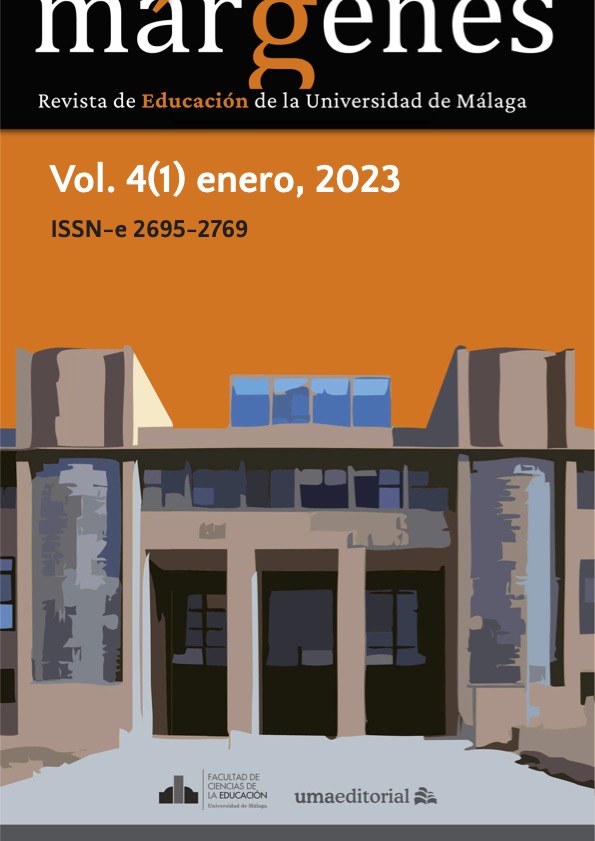The possibility and its possibles
DOI:
https://doi.org/10.24310/mgnmar.v4i1.15064Keywords:
possibility; possibles; literacy; freedom; neoliberalism, possibility, possibles, freedom, neoliberalismAbstract
This minimal history places us within possibility and its possibles. By adopting these keys, we make room for thinking, believing and feeling that there are alternatives to those imposed as the only viable ones for education and public schools. The "impossibilist ideology" (Puciarelli, 2005) is responsible for generating this blindness or denial. We can get out of this confidence in the sense that is proper to possibility; it represents choice, change, freedom. Possibility has a real transformative potential and, for this, an alphabetization of possibility is necessary.
Downloads
Metrics
References
Cassier, E. (2004). El mito del Estado. FCE/Col. Popular.
Cortázar, J. (1997). Rayuela. ALLCA XX.
Lerena Alesón, C. (1989). Escuela, ideología y clases sociales en España. Círculo de Lectores/Ciclo Ciencias Humanas.
Lledó, E. (2022). Identidad y amistad. Taurus.
Pellizzetti, P. (2009). El fracaso de la indignación. Del malestar al conflicto. Alianza Editorial.
Pucciarelli, A. R. (2005). El régimen político de las nuevas democracias excluyentes de América Latina. Argentina
- 2001.
- HAOL, (8), 105-122.
RAE (2021). Diccionario de la Lengua Española. Edición del Tricentenario. https://dle.rae.es/
Santos, B. S. (2017). Justicia entre saberes: epistemologías del Sur contra el epistemicidio. Morata.
Tamayo, J. J. (2018). Los desafíos de la educación hoy: Laicismo, conciencia crítica, interculturalidad,
justicia de género y utopía. En R. Vázquez Recio (coorda.), Reconocimiento y bien común en educación
(pp. 259-284). Morata.
Wittgenstein, L. (1999 [1953]). Investigaciones filosóficas. Altaya.
Downloads
Published
How to Cite
Issue
Section
License
The editorial team of Márgenes supports an open Access policy of scientific knowledge. apostamos claramente por una política de acceso abierto del conocimiento científico (see Berlin Declaration).
Authors with work published in this journal accept the following conditions:
- This journal provides immediate free access to its content under the principle of making research freely available to the public. All contents published in Márgenes are subject to the Creative Commons Reconocimiento-SinObraDerivada 4.0 Internacional
It is the responsibility of the authors to obtain the necessary permissions of the images that are subject to copyright.
Authors whose contributions are accepted for publication in this journal will retain the non-exclusive right to use their contributions for academic, research and educational purposes, including self-archiving or deposit in open-access repositories of any kind.
The electronic edition of this magazine is edited by the Editorial of the University of Malaga (UmaEditorial), being necessary to cite the origin in any partial or total reproduction.
- Authors can enter into other additional independent contractual agreements for the non-exclusive distribution of the version of the article published in this journal (e.g. including it in an institutional repository or publishing it in a book) on the condition that they clearly indicate that the work was originally published in this journal.
- Authors are allowed and recommended to publish their work on the Internet (for example on institutional and personal websites), before and after the publication, as this could lead to constructive exchanges and a more extensive and quick circulation of published works (see The Effect of Open Access).














